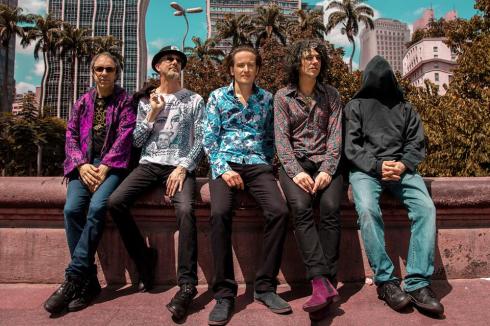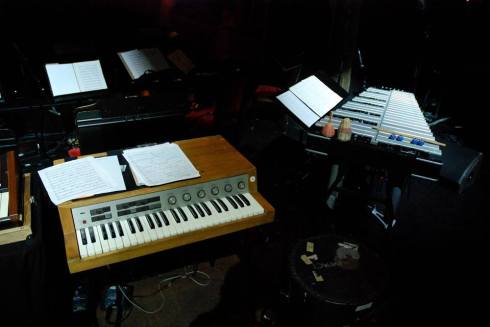John Doran of ‘The Quietus’ wrote a pithy, on-the-nose article a while back about the ongoing corruption of big music festivals, lambasting them as “unsatisfying money hoovers designed to deplete your bank account for minimal return… a heavily branded and patronisingly over-mediated experience – with little in the way of the rough round the edges, unexpected, challenging or genuinely exciting experience that makes being a music fan worthwhile; just a massive spoonfed dose of the ubiquitous, the hyped and the monolithically popular.”
As a follow-up punch, John slashed a hole in the backdrop in order to expose the ethics behind the festival business: how, even as you’re frolicking in a ludicrously overpriced facsimile of countercultural free-spiritedness, your ticket money wriggles its way into the war chests and “shockingly regressive campaigns” of suspect billionaires intent on crushing any genuine counterculture that’s little more than a cheery mask on a product, funding a host of life-killing causes including anti-LGBTQ, anti-union and anti-immigration initiatives. Unsurprisingly, he concluded “personally I’d sooner go to a smaller, more grass-roots independent festival and have a clutch of genuinely odd, uplifting, joyous and memorable experiences on a smaller, freer scale.” He lists plenty of smaller, more conscientious festivals which might better suit your ethics or your conscience – Supersonic, End of the Road, many more. Modestly, he didn’t mention ‘The Quietus’s own efforts .
I might lack John’s edge, but I’ll still say amen to all that. There’s also always the option of going further off the map, seeking out festivals beyond the tents’n’burgers belch. I’ve covered some such here… Marchlands’ annual musical/theatrical celebration of reaching across borders and understanding history; the composer-driven London New Wind Festival; New York’s wonderfully brainy and diverse Ecstatic Music Festival. On a more domestic level, there’s next month’s Whole World Window 2 in Preston, raising urgent money for psychedelic hero Tim Smith’s health care while also functioning as a focussing lens for assorted rock and pop acts existing in a rowdy, complex continuum outside ot the mainstream. The staunchest supportive and communal ethics, unsurprisingly, still hover around punk events, those pass-around-a-donation-bucket battles for big values in small places (I might often be bored by the music, but I profoundly admire the commitment and the generosity of spirit).
* * * * * * * *
As regards the coming week, Gloucestershire’s EppyFest – just a week away now – is the epitome of a pocket festival. Now heading in its seventh year, it also pretty much defines “boutique”. Its amiably knitted-together selections of psychedelic rock and pop, folk, electric and acoustic chamber music and accomplished instrumentalist is undeniably cosy, but in the right way – unashamed and unaggressive, slightly specialised while toting an inclusive audience ethic. There’s a rosy English glow to it, alright, but not the kind which shoulders out differences while indulging a truculent and moneyed bucolic fantasy. The Eppyfest England is one which is comfortable in itself, but not too smug to look outwards: mostly white, but not bleached and angry. In the best sense and intimation, it’s a liberal parish.
The Friday lineup, starting in the evening – is the briefer concert, with just two sets of performers. The headliners are the current and ongoing version of cosmic-rock libertine troupe Gong, still romping along after the death of founding holy prankster Daevid Allen. This isn’t the first time there’s been a post-Allen Gong: percussionist Pierre Moerlen floated a de-hippified mid’-70s jazz-rock version around Europe which had little to do with Allen’s mischievous space rock parables, while the band’s original feminine-mystiquer Gilli Smyth led a sporadic Mother Gong version at points in the ’80s. This, however, is the first Gong that’s been a direct continuation of Allen’s work: thumbing its collective nose at his departure from music and from life, and mourning him by celebrating his ethos.
This Gong iteration is helmed by delightfully wayward, larger-than-life Anglo-Persian prodigy (and ‘Misfit City’ favourite) Kavus Torabi, who established himself as one of the premier, most open-eared British psychedelic talents while with The Monsoon Bassoon and Cardiacs, has continued it with Knifeworld and Guapo, and who has in effect been rehearsing for Gong leadership for the whole of his musical life. Expect the same applecart-overturning riffs, the mingled brass and electric strings, the space-dust party atmospheres. The old firm’s still a family.
In support, Liverpudlian guitarist Neil Campbell is arguably one of the most gifted musicians still unknown to the general public. An omnivorous stylistic polymath, he’s mastered contemporary classical, progressive rock, jazz and assorted other styles to the point in which he can pass seamlessly between and through them; and he comes trailing awestruck references from guitar scholars and crossover music master musicians alike. Working off nylon- and steel-strung acoustic guitars (with a chain of echoes, loop pedals and other processors) he creates detailed, fiery electro-acoustic tapestries when playing solo: given the opportunity, he’ll also roll out orchestral concerti, small ensemble pieces, vital building-block contributions to the larger works of other, and site-specific concerts in venues of all kinds.
North Sea Radio Orchestra headline Saturday’s seven hours of music – as ever, they draw together Anglo-pastoral classical, a stolen kiss or two of folk melody, crossover chamber music and English art-rock. (They’ve covered Robert Wyatt, as well as old Christmas carols and Vernon Elliot). Sixteen years in, they’re a little smaller and tighter than they used to be – the choir is long gone and the ensemble streamlined, with most of the Victorian poetry settings consigned back to the bookshelf in favour of more personal lyrics of chalkhills and children, lost loved ones and the make-do-and-mend of life.
They’re still a quietly enchanting proposition, gently webbed together by a deceptive fragility, a village-singer tone and Craig Fortnam’s elegant compositions, and they grow ever more comfortable in themselves as the years pass. From German kosmische, they bring in that cosmic powerplant throb: from Frank Zappa and Canterbury, the somersaults of harmony and tinkle of xylophone (with the lyrical coarseness and silly whimsy gently steered out of the picture); from English chamber music, the gentle green ache. All soft borders, all subtle mind.
Second down the bill is Doris Brendel. The Vienna-born multi-instrumentalist daughter of concert-piano legend Alfred Brendel, she originally made her mark in ‘90s neoprog and underground AOR providing vocals, guitar, sax and flageolet to The Violet Hour: when that didn’t last, she applied herself to whatever was going while cultivating her own records in her own time. She’s refined her earlier approach, but what you get now is still pretty much what you got then – a singer who can go from a dream-folk murmur to a gutsy rhythm-and-blues blast, who puts on an assured show of muscular rock and costumed pizazz. An old-school rock chick, but one who’s taken control and honed it to excellence. There might be differences in tone, but latter-day ladyrockers like She Makes War and Ciara Clifford might look to her and immediately see a spiritual older sister.
Via a shifting gambler’s hand of interrelated projects – and a proven ability to survive practical and artistic disruption – the persistently thoughtful Oxford prog-rock collective Sanguine Hum have explored music for nearly twenty years now. In many respects, they’re a back-to-first-principles prog-initiative. Rather than constructing vast vanity pieces (as if to impress their aspirational Mellotronic forebears), the Hum are based very much in a lush’n’lambent ’70s pop mode – as least as much Neil Young, Steely Dan or David Bowie as Genesis, Zappa or Canterbury – which they can then wilfully and logically expand to bigger and broader things (engulfing and building upon later influences such as Boards Of Canada along the way).
For this acoustic-slanted EppyFest slot, lead singer/guitarist Joff Winks and keyboard player Matt Baber (the latter fresh from last month’s release of his “ambient prog minimalism” solo album ‘Suite For Piano and Electronics‘) will play as a duo; exploring at least one track from each of the project’s scattered albums and personae, with new material as a bonus.
Electric chamber group Firefly Burning were to have held the middle of the bill but had to pull out. To replace them, in comes a harder noise in the shape of the explosive wit, ominous chording and multi-layered songwriting of London’s Thumpermonkey. I described them a while back as “the missing link between Peter Hammill and Neal Stephenson”: a tag which they really seemed to like, so let’s run with it. A motley crew of brainiacs, meticulators and fast friends with their heads in lofty places and their toes sunk in dirty post-metal, they have the kind of esoteric preoccupations (and the wherewithal to communicate them) which encourage interest rather than eye-rolling and detachment. Unshamedly weird-fictional, the songs have covered Nigerian email fraud, Aztec hauntings, bizarre medical conditions and Victorian explorers amongst many other topics, all via a rich filter of literary and cinematic techniques and dark, sophisticated humour.
As for the music, Thumpermonkey play within that increasingly rare strata of hard rock in which there’s room to breathe, think, listen and explore beauty as well as nail down a predatory riff. Michael Woodman sings like an athletic college don moonlighting as an operatic priest, while his cohorts Ben, Sam and Rael construct a moving fortress, observatory and interdimensional vessel for him to stand on. They’re the kind of band that either make you proud to be curious, or will magnetize your brain into a state of curiosity. In effect, they’re the ‘Infinite Monkey Cage’ of British post-prog and we’re bloody lucky to have them.
Bristolian progressive-grunge rockers Lord Of Worms cite Meshuggah, Soundgarden, Tool and Ufomammut as influences, and there’s certainly some roiling springy punktone bass and restless post-hardcore rhythmic shifts in the mix. Their folk lilts and Zoie Green’s burnished-silver vocals simultaneously tie them into a tradition of female-fronted folk-rock acts like Renaissance and The Morrigan. Judge for yourselves…
Like Sanguine Hum, Dutch/American crossover prog poppers Fractal Mirror will be playing under reduced circumstances as regards personnel, but probably not in terms of the music. While the band can rely on the assistance of Echolyn polymath Brett Kull, among others, in the studio, this live date will just feature their core duo of singer/guitarist/keyboard and recorder player Leo Koperdraat and lyric-writing drummer Frank Urbaniak. Expect intimate expansions on their recipe of dove-soft Mellotronics and pastoral post-Porcupine Tree moods, with their hidden freight of darker, reflective lyrics.
Sonic Bond Promotions & The Epileptic Gibbon Podcast present:
EppyFest 7: North Sea Radio Orchestra + Gong + Neil Campbell + Sanguine Hum + Doris Brendel + Thumpermonkey + Lord Of Worms + Fractal Mirror
St Margaret’s Hall & Annex, Coniston Road, Hatherley, Cheltenham, Gloucestershire, GL51 3NU, England
Friday 27th July 2018, 7.00pm – information here and here
Saturday 28th July 2018, 1.00pm – information here and here
* * * * * * * *
It would be stupid of me to represent EppyFest as some kind of absolute template for festivals. It’s its own little Gloucestershire gem, it has its context and its taste-palette, and while it’s a fine refresher there’s far more to contemporary music – to a nourishing cultural diet – than even a thoughtful slipped-weekend like this one can provide.
What I am advocating is a spreading of its care-filled cottage ethos; its preference for building a relatively equal, mutually supportive community of performers and audients in a warm and humble space, rather than driving a rush of drainable, soakable human cattle through the money-mill. Events like this are worth the seeking-out, worth the effort that goes into their creation. Go find some. Go make some. Come tell me about them.





















